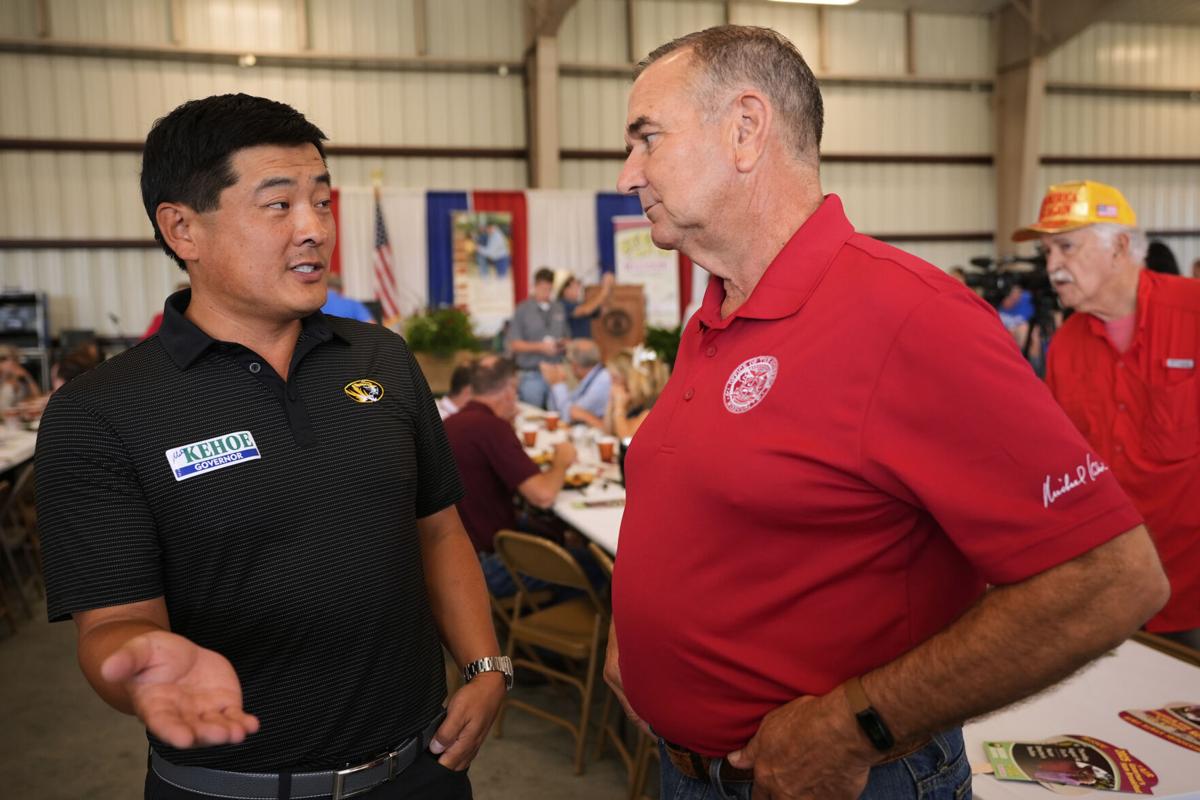JEFFERSON CITY — After weeks of internal talks and a pressure campaign by President Donald Trump, Missouri Gov. Mike Kehoe on Friday called lawmakers into a special session beginning next week to redraw the state’s congressional maps.
With a long holiday weekend looming, Kehoe issued a press release in the late afternoon to reveal news that along with redistricting, he wants lawmakers to make it harder for residents to alter the state Constitution via the ballot process.
“Today, I am calling on the General Assembly to take action on congressional redistricting and initiative petition reform to ensure our districts and Constitution truly put Missouri values first,” the governor said. “This is about clarity for voters and ownership of our future, and I hope the legislature will work together to pass our Missouri First Map and critically needed IP reform.”
People are also reading…
The governor included a with the announcement.
The new map, Kehoe said, would split fewer counties and cities than the existing map, would preserve two congressional districts as currently drawn, and keep every member of the state’s congressional delegation in their current districts.
Trump wants Republican states to redraw their political boundary lines to favor GOP candidates in the mid-term elections in hopes of keeping the U.S. House in Republican hands.
In his announcement, Kehoe asked the House and Senate to draw new district boundaries in hopes of ousting longtime Democratic U.S. Rep. Emanuel Cleaver of Kansas City.
The proposal to make citizen-led initiative petitions more difficult to enact, is a GOP response to Missouri voters approving a laundry list of progressive changes at the ballot box in recent years, including lifting a ban on abortion and the expansion of Medicaid.
Under existing law, any constitutional amendment takes effect when approved by a simple majority of voters statewide. Many of the recent questions that won approval have enjoyed heavy support in the state’s blue-leaning urban population centers, while not faring as well in Missouri’s red rural regions.
“I firmly believe we need to fix that,” Kehoe said Friday. “We have too much outside interest coming in spending lots of money in Missouri, somewhat deceiving Missourians of what their position is. It’s just too easy to change our constitution.”
The governor has proposed that a statewide ballot measure be approved only if a majority of voters statewide and a majority of voters in each congressional district vote to adopt the proposed measure.
“It might be just time to raise that bar a hair for that process,” Kehoe said.
Democrats have cast the mid-decade redistricting maneuver as a bid by Trump to bury further disclosures related to his relationship with the late financier Jeffrey Epstein, who was a convicted sex offender and accused of sex trafficking young women and girls as young as 14.
“If Democrats retake the House, they will release the Epstein Files, and this scares the hell out of President Trump. That’s why the President has ordered Missouri to rubber stamp a rigged map drawn in Washington, D.C., because he knows Missouri Republicans would rather protect pedophiles than say ‘no’ to Donald Trump,” Senate Minority Leader Doug Beck said.
Missouri has eight U.S. House seats, two of which are held by Democrats. The task for Republicans is to change the partisan make-up of the Kansas City-focused 5th district, resulting in one additional GOP vote in the House for Trump’s policies.
The map offered by Kehoe drastically alters the 5th district by extending it from the Kansas border into mid-Missouri, including Maries and Osage counties. The 2nd district, now represented by Republican Ann Wagner, would lose a chunk of St. Charles County.
The concept drew immediate scorn from Rod Chapel, president of the Missouri chapter of the NAACP.
“Splitting Kansas City’s Black population — a community with a rich shared heritage and common interests — into multiple districts dilutes their voice and weakens their representation,” Chapel said. “This proposal is about politicians choosing their voters, not voters choosing their representatives.”
Similar efforts to stack the partisan deck are underway in red and blue states in an unprecedented mid-decade redistricting push for power spurred by the White House.
Republicans in Texas are trying to flip five seats. Indiana also is attempting to find one more GOP district.
Democrats in California are hoping to neutralize any Republican gains by drawing new districts favoring their party. Illinois, Missouri’s Democrat-controlled neighbor, appears unlikely to join the fray.
Democratic U.S. Rep. Wesley Bell’s St. Louis-area 1st district is unlikely to be radically affected if the GOP has its way, but voters in the St Louis suburbs likely will face changes to account for the dilution of Democratic votes in the western part of the state.
Kehoe’s announcement came a week after Trump wrote on social media that “The Great State of Missouri is now IN. I’m not surprised… We’re going to win the Midterms in Missouri again, bigger and better than ever before!”
Legal experts question whether mid-term redistricting can be done. Jefferson City attorney Chuck Hatfield, who served as a top official in the Missouri attorney general’s office in the 1990s, issued a memo dated Aug. 25 saying the state constitution prohibits what is about to happen.
“Any attempt to do so will draw a substantial legal challenge which will likely succeed and invalidate any map adopted by the General Assembly,” Hatfield said.
Kehoe told reporters earlier Friday he had been briefed on the legal ramifications.
“I’ve heard opinions on both sides of that conversation. It will get settled in due time,” Kehoe said.
University of Missouri-Columbia political scientist Peverill Squire said Kehoe’s decision carries political risks for Republicans.
“I am sure he knows that this will not be popular with most Missourians. Whatever the General Assembly passes will be contested in court, which will put congressional races on pause until it gets resolved. And if they do get a map that tries to add another Republicans seat, they risk putting some of their other seats at risk, particularly if 2026 turns out to be a good year for the Democrats,” Squire said.
The governor, who is in his first year as chief executive, waited to make his plans known until after many Missourians headed into a long Labor Day weekend marking the traditional end of summer.
The so-called Friday holiday weekend “news dump” had been anticipated by aides in the Legislature, who have been prepping to bring lawmakers back to the Capitol since the issue surfaced last month.
Behind the scenes, the House and Senate have rebooted their redistricting software, unused since a heated 2022 battle based on 2020 Census population figures that resulted in the current 6-2 map.
It was not clear Friday what role Trump would play in drawing a new map. The White House did not respond to repeated requests for clarification.
The timing of the session coincides with the General Assembly’s regularly scheduled Sept. 10 veto session, meaning members already will be in town when they begin debate. With little appetite among the GOP majorities for overriding any of Kehoe’s budget vetoes, the fall session had been primed to serve as an annual fundraising bonanza for lawmakers.
Democrats have been issuing fundraising alerts connected to the redistricting battle.
“This isn’t just about one district — it’s about whether Missouri voters get to choose their representatives, or whether politicians get to rig the rules to choose their voters. And with Trump’s political machine and a Republican supermajority pushing hard, the danger couldn’t be greater,” said Missouri Democratic Party Chairman Russ Carnahan, a former congressman.
House Minority Leader Ashley Aune, D-Kansas City, mocked Kehoe in a statement, calling him a tool of the president.
“The governor’s complete capitulation to the president’s will proves that Donald Trump — not Mike Kehoe — calls the shots in Missouri, while the man Missourians elected to lead our state is a mere puppet responding to his master’s commands,” Aune wrote.
The special session could be a repeat of 2022, when lawmakers sparred over a conservative plan to lock in a 7-1 GOP-leaning map during the once-a-decade redistricting process, which is based on the U.S. Census. That effort failed amid concerns the maneuver could backfire and dilute strong Republican districts with enough Democratic voters to change party representation.
Kehoe for weeks has said the move would counter gerrymandering in Democratic states and keep House Speaker Mike Johnson of Louisiana in control of the U.S. House, rather than allow Democrats to win and put U.S. Rep. Hakeem Jeffries of New York in charge of the chamber.
Despite the president’s pressure on Missouri and other GOP states to make the maps more favorable to Republicans, ������Ƶ officials have been wary of the exercise because of the long-term political effects it could have on future legislative business.
House Speaker Jon Patterson, R-Lee’s Summit, earlier suggested that redistricting could sow more dysfunction in the Missouri Senate where filibusters commonly are used by Democrats in the minority to slow down action and force negotiation.
Aune said Republicans could win Trump’s initial battle, but lose the longer political war.
“The governor and every rational Missouri Republican knows reopening congressional redistricting six years ahead of schedule to try to create another GOP seat not only is wrong, but likely to backfire. That’s why Republican lawmakers overwhelmingly voted against the idea just three years ago,” she said.
Gov. Mike Kehoe said his administration will have a Department of Government Efficiency during his State of the State address on Jan. 28, 2025.












